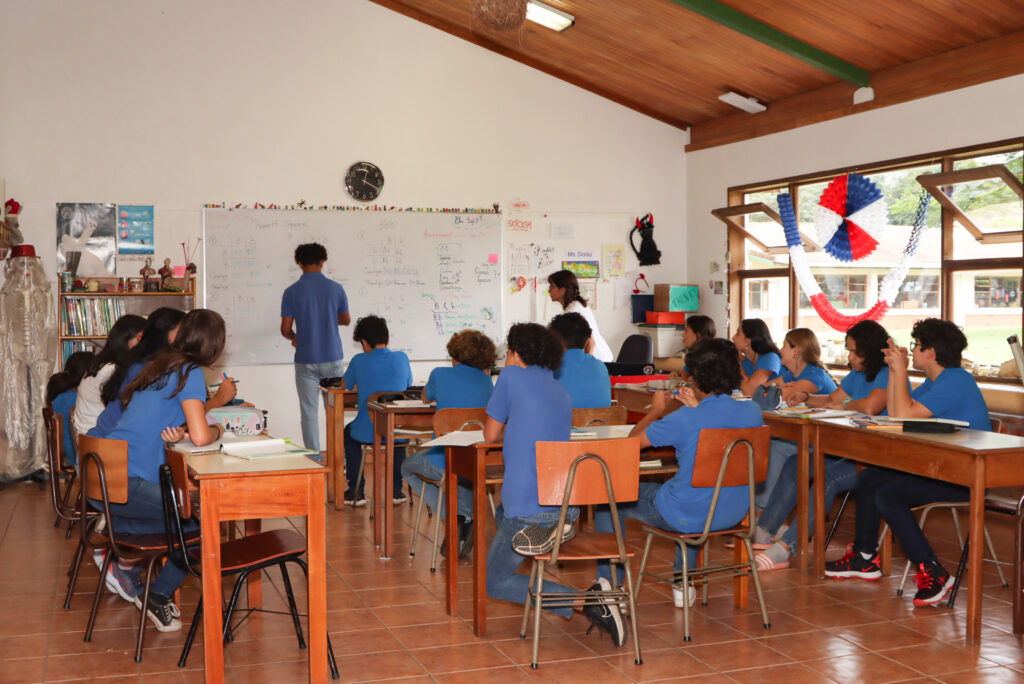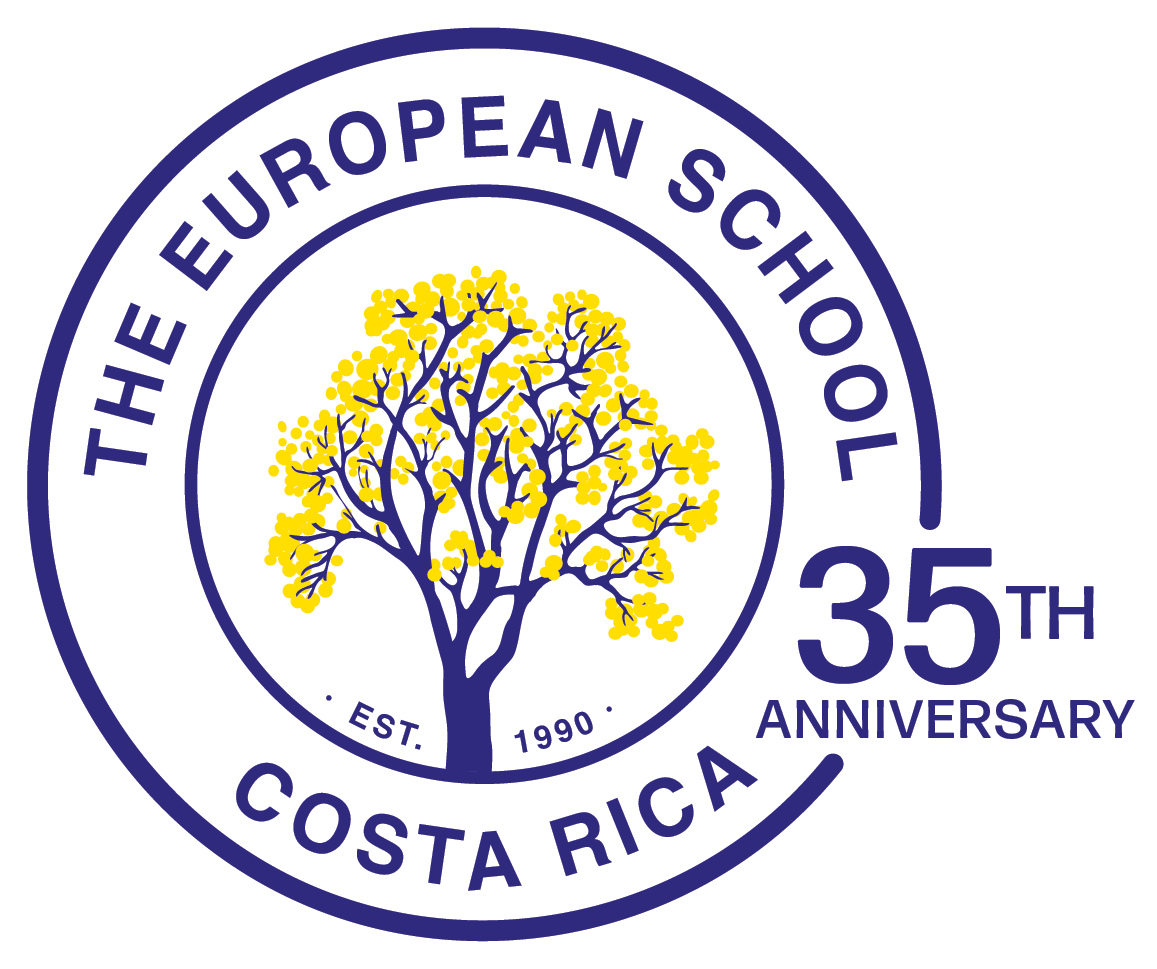School Profile
The European School is able to accommodate approximately 540 students. It is presently serving students and teachers from over forty countries around the world, distributed into 14 levels where a class size is ideally 20 students.
The school follows its own balanced calendar, breaking every nine to ten weeks for short vacations, so as to provide students with rest periods.
The school day runs from 8:15 a.m. to 2:45 p.m. (Wednesday are half days) followed by a rich extracurricular offering of activities that complement students‘ academic training.
The European School is accredited by Costa Rica’s Ministry of Public Education as well as by the International Baccalaureate Organization (IBO).
Curriculum
Integrated teaching is the key to the philosophy and approach to learning at The European School. Central themes unify and interrelate academic work in literature, history, geography and art through the broader perspective of a given geographical area or historical period.

Preschool
Preschool
Wonder and Imagination
The Preschool emphasizes a calming atmosphere where emotional sensitivity, responsibility, respect, and aesthetics are developed through play, art and music. The imagination fostered in these early years lays the foundation for later abstract skills in reading and math.
We offer violin classes to all students in preparatory looking to increase their fine motor skills, attention span, and musical sensitivity. Those who show disposition will be part of our string orchestra later in the primary.
.
Elementary School
Grades 1 to 3: I can read!
Children begin to tackle academic subjects, primarily reading and writing through “meaty” readers. Emphasis is also placed on poetry, music, art, the natural sciences and the use of manipulatives in mathematics. From a student’s naturally-inquisitive mind arises a genuine enthusiasm for discovery; all things magical and mysterious hold great fascination for them.
To tap this natural inclination, fairy tales from all over the world are introduced and children begin to learn about the fascinating variety of human expression.
Each classroom has a wealth of books and information chosen to pique the children’s natural curiosity which the teacher helps to shape in directing their interests.
Elementary School
Grades 4 to 6 – On a fact finding mission
At this stage, children become more aware of their surroundings and are fascinated by facts about the world: “The Guinness Book of World Records” stage. The central theme in fourth and fifth grade is the history of The United States (early history and development of the nation), while sixth grade spends the whole year on studying the African continent in depth. Through these broad themes, children study history, geography and the biographies of remarkable people. Teachers awaken interests through appropriate literature placing great emphasis on the child’s own creativity.
Each classroom is equipped with a library of, at least, three hundred books, including copies of dictionaries and thesaurus which students use regularly. Intensive reading and daily writing exercises develop language skills as well as the thinking process, without the use of computers or any other technological device.
Elementary School
High School
High School
Grades 7-10 Tackling abstract concepts
Students follow the advance of civilization from ancient to modern times, tracing the development of humanity from relatively simple civilizations to a highly intricated modern world; their own development as thinkers progresses in much the same way.
Students start developing skills in abstract thinking, they learn how to organize information and make links and connections that will provide them with a comprehensive view of a world where everything is but a fraction of the whole. In seventh grade, the theme is the ancient Mediterranean civilization. Eighth graders move on to the Middle Ages, ninth graders to Latin and North American literature while tenth graders study Asian novels. Once again, literature, history and art are taught through the perspective of these settings and contexts.
Math and science skills are strengthened at this stage, following the European approach where each year the same topics are addressed but in an increasing complexity and depth. Processes are studied rather than the results, to reveal the interconnectedness of components.
The European School places a high value on the fine arts, encouraging students to express their artistic talents through art and music.
This integrated curriculum prepares students for the greater challenge of the IB Diploma programme; a two-year course of advanced study that readies them for entrance into university.
The International Baccalaureate Program
Grades 11-12
The European School is accredited by The International Baccalaureate Organization (IBO), a non-profit organization based in Switzerland that has developed an academically challenging and balanced program of education. Its strong emphasis on the ideals of international understanding and responsible citizenship encourages IB students to become critical and compassionate thinkers, lifelong learners and informed participants in local and world affairs. The European School, one of the forty-nine IB schools in Costa Rica, has been offering the program since 1997. Students achieving IB diplomas are accepted at hundreds of universities throughout the world including some of the world’s most prestigious, often on a preferential basis and with advanced standing. Under the program, eleventh and twelfth-grade students at The European School choose courses from the following subject groups: studies in language and literature; language acquisition; individuals and societies; sciences; mathematics; and the arts.
To earn the diploma, they must complete an extended essay, a two-year course in TOK (Theory of Knowledge) and CAS (Creativity, Activity, Service).

